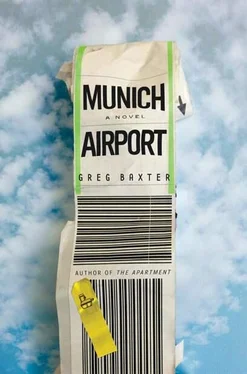When the hunger pangs started, and the sweats and nausea were strong, and I couldn’t stop the trembling, I found that exercise could take my mind off it. I did push-ups and sit-ups, or laps around the huge rooftop terrace in the freezing wind and rain. I hopped on my bike and rode up and down hills, crossed intersections, raced cars, hurried everywhere. And when I stopped, it felt, sometimes, as though I had eaten. I also thought of food, I placed before my mind’s eye huge platters of food, delicious food, expensive food, and I let myself dream of eating it, digging flesh out of lobster claws, eating two-inch-thick rare steaks, sucking the last bits of meat and skin off a whole hen. This was effective but it felt dishonest. It made me feel I was discrediting the whole experience, and Miriam’s experience along with it. So I started to refuse to let myself think of food. If I found myself thinking of food, I immediately forced myself to think of Miriam’s body, lying in the morgue. After that, I found that brushing my teeth averted hunger. I went and bought some German toothpaste that tasted a little like bleach, and for a while I was brushing my teeth every thirty minutes. When I began to realize that I was swallowing and eating the toothpaste, I quit that, too. And all there was left was to see it through, to face the desire to eat and refuse, to reject the body’s need for sustenance. I’d go to my en suite and lie on the floor and convulse and pull my ears out and pull my hair and scratch my face and throw myself over the toilet when I couldn’t vomit anything up, and during these convulsions I could see clearly and objectively that to save myself from this pain was hedonism, that everything above this pain was extravagance. And the greatest thing about this pain was that while it was happening you could feel yourself disappearing, cell by cell, breaking down and getting thinner. Then the convulsions would end and I would lie there and think of Miriam and how much she must have hated us, or the pity we wanted so badly to proffer her, in order to go through this. Our faith that she would one day need us again, just as we needed her, no doubt belonged to the hedonism and extravagance and stupidity of life above the pain of starving. I started to eat little bits of bread because the convulsions and attacks were getting more severe. Every time I had a piece of bread, even a bite, I would go and look in the mirror, and I saw I had fattened dramatically, that I was carrying so much useless and unclean weight. And until I was hungry again — until I knew I was suppressing my body’s distress — I saw and felt myself fattening. Whenever I thought of returning to London, I felt myself fattening — expanding with habits, ideas, opinions, things — and it seemed to me that my work was not just keeping me in circumstances that allowed for and required this expansion but it was a plague, an incurable and inescapable plague of superabundance and anxiety. I was so preoccupied with my own struggle that it took a couple of days to realize that my father hadn’t been eating, either. He looked tired, emotionless. He said he couldn’t get warm, even though we had the heat up as high as it would go in our apartment. He would suddenly sit down and complain about blindness, numbness in his hands and feet, and now and then, if the seat were comfortable enough, he’d fall asleep for thirty seconds. I thought our trip had exhausted him, and the reality that Miriam would be released soon, and that our time here, and his time with Trish, would be over, was sinking in. Then he started vomiting, or at least heaving, in the bathroom of our apartment.
Trish and I stop first at a men’s casual clothing store. I need socks, I say. I lift up my trouser legs to show her my bare ankles, and I say, Don’t ask. What does your dad need? she asks. Everything, I say. She says, You get the pants and whatever else, I’ll get a shirt. I say, I’ve got a better idea, you run across to the shoe store and grab him some shoes. Perfect, she says, and she walks out of the clothing store. I watch her. She gets about twenty feet away, stops, turns around and jogs back. What size would you say? she asks. I say, No idea, I’m a twelve, that’s probably a safe size to get. Okay, she says, and she walks out again. Sizing his clothes is much easier. We’re the same height, and though he is thinner around the neck and waist, along the arms and legs — he has the frame of a slim, elderly man — we have similar proportions. I get him a white T-shirt with an ocean scene with a surfer and some writing on it. I get him a soft, blue, thick button-down long-sleeve shirt to wear over the T-shirt, and I get him a navy-blue hooded sweatshirt. It has a design on the back, some writing and a cityscape, but it’s for warmth and comfort on the flight. I also get him a pair of jeans, thirty-two waist, thirty-four inseam, some boxer shorts, and a pair of socks — I get a pair of socks for myself, too. At the counter, as the woman is ringing everything up, I look down at what I’m wearing — the ragged suit jacket with sweaty armpits, the shirt that is soaked through with sweat almost everywhere, and which stinks of boozy, nicotine-y perspiration. I go back and get myself a gray hooded sweatshirt with a black scorpion on it for the flight as well. The cost of it all is just under five hundred euro. I don’t even try to pretend to not be shocked. I tell the woman behind the counter, That is ridiculous, it’s mercenary. She doesn’t know how to respond. Do I refuse to pay? she wonders. She cannot see my eyes behind the sunglasses, but I am trying to express my sense of futility through them. What can be done about airport prices? I want to ask. I pull my wallet out. How much is the sweatshirt? I ask. She shows me the price tag. It’s eighty-nine euro. Then I see that the jeans are a hundred and fifty. I feel outraged, but I shouldn’t be. London is more expensive, and it’s actually my job to help make affordable things expensive, mostly by redefining, or reverse-defining, unaffordable. I give her my business credit card. I have a twenty-thousand-pound limit on that card, but every month the bank direct-debits the full amount I owe. When I got the card, I said, Not much of a credit card, is it? He said something about responsible business habits — this was a time when people took advice from bankers — and I said it didn’t matter anyway, my business didn’t require a lot of credit. I never had to go back and ask for an upgrade. I pay myself a decent salary. I try to expense everything I can — even a portion of my rent, and some of my utilities, and any travel. I pay myself a bonus at the end of each year with whatever I have left — in order to avoid corporate tax. I pay my accountant. And I start over. Every couple of years I take any savings I’ve accumulated and put them into stocks and mutual funds in the US.
I get everything in a big bag and walk out. I don’t immediately see a shoe store. The nausea and fatigue I’ve felt since leaving my father in the bathroom becomes a sudden and unbearable light-headedness. My legs become almost too heavy to move. I am numb. I find a chair — there is finally some emptiness in the airport. I sit down and put the bag between my legs and think that I must take my phone out to text Trish my whereabouts. But I cannot pick up my phone. The exhaustion is like nothing I’ve experienced. I have a moment of dream thought, a dream I’m conscious of having. My father and I are digging with shovels. The ground is frozen. Then I feel someone poking my shoulder and it’s Trish. I open my eyes and realize my head is all the way back, without any support. I nearly give myself whiplash trying to lift my head. I sit up and cough. I try to speak but my throat is dry. Trish asks, anxiously, if we should go. I don’t want to admit that I cannot move. I try to speak but I can’t make any sense. I make the kind of noises one makes with a jaw full of novocaine. I shake my head. I clear my throat a few times and I can speak again. I say, Just give me one minute. She sits down beside me and I lean forward. I put my elbows on my knees and my eyes on the cups of my palms. Then I scratch my head for a while. I wiggle my toes and fingers.
Читать дальше











